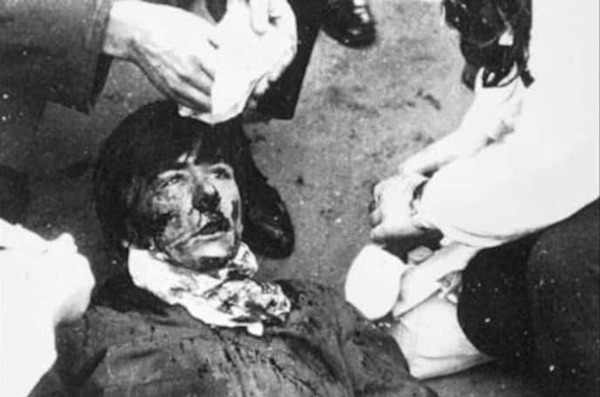
A damages payment to a survivor of the British Army’s Bloody Sunday massacre is being seen as a step towards the goal of achieving real justice for the victims, rather than compensation.
Thirteen people were shot dead when British Army paratroopers opened fire on civil rights demonstrators in the city in January 1972. One of the others wounded on the day died later.
The payment was the first of four test cases in the civil damages claims. Michael Quinn’s injuries were singled out to represent the surviving injured.
The court acknowledged that Mr Quinn and “all the victims were innocent victims”. It also noted that no attempt was made to defend the soldiers responsible.
Michael Quinn was just 17 years’ old when he was shot through the mouth with a high velocity bullet. He suffered terrible injuries which resulted in a lifetime of pain and difficulty. He told the court how he felt an “explosion” of bone and blood when was hit while trying to run for cover.
The payout also includes recognition of the “oppressive, arbitrary and unconstitutional” cloud of suspicion which was maintained by British officials over Mr Quinn and the other victims for decades, until the Saville Inquiry established the innocence of all those killed and wounded.
In 1972, the Bloody Sunday families were paid a small amount in compensation. Paid “ex gratia without admission of liability,” the small payments were considered an insult by the families. Some gave the money away to charities in Derry.
In the coming days, the cases of Peggy Deery, Michael McDaid and Gerry McKinney will be heard. The families have been at pains to stress that the current court action is not about money.
Now aged 63, Dublin-based Mr Quinn recalled in his evidence being a 17-year-old A-level student who had gone with friends to the march. But after the British Army started firing he fled from the Rossville Street area amid growing fears at the unfolding events. He told of seeing a soldier emerge from behind flats, looking in his direction and place a bullet in the breech of his rifle. He then crawled and ran into Glenfada Park North in an attempt to take shelter.
While there he saw the body of Michael Kelly, one of those fatally wounded, being carried. As others began to surge into the area, shouting that soldiers were coming in, Mr Quinn headed, crouched down towards an alley. He had just made it over a raised area when the bullet hit him.
“It felt like someone had given me a very hard punch to the face,” he told the court. “Just below my eye I could physically see droplets of blood and bone and skin exploding from my face.”
He continued: “It felt like slow motion as it was happening, I could see also that someone else was falling beside me. I saw his head hit the pavement, he hadn’t put out his arms to break the fall.”
That man turned out to be James Wray, another of those killed, who had asked Mr Quinn to help carry the civil rights banner earlier in the day. Mr Quinn managed to stumble on until he was brought to a first aid post and then taken to Altnagelvin Hospital.
Ahead of the start of the hearings, the families were disappointed that they had to go to court and relive the events of the day before securing a settlement, despite their complete exoneration by the Saville Inquiry and the subsequent apology by the then British Prime Minister, David Cameron
Outside court, Mr Quinn’s lawyer, Fearghal Shiels, said: “No amount of money could compensate Mr Quinn for the physical and mental scars that he has carried with him every day since 1972.
“This action, and the apology by David Cameron, was an inevitable consequence of the Saville Report and the unambiguous declaration of innocence of all of the victims of Bloody Sunday.”
The families believe that the next logical step in acknowledging the absolute innocence of the victims is the prosecution of those responsible for the deaths and injuries.
![[Irish Republican News]](https://republican-news.org/graphics/title_gifs/rn.gif)
![[Irish Republican News]](https://republican-news.org/graphics/title_gifs/harp.gif)

